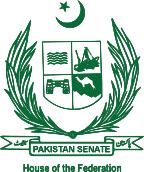
The Senate of Pakistan or Aiwān-e-Bālā Pākistān, constitutionally the House of the Federation, is the upper house of the bicameral Parliament of Pakistan. As of 2023, It has a maximum membership of 100, of which 92 are elected by the provincial legislatures using single transferable vote. Four represent the Federal Capital and another four are representing former Federally Administered Tribal Areas, until membership expiration in 2024. Members sit for terms lasting six years, with half of the house up for election every three years. Unlike the National Assembly, the Senate is a continuing chamber and hence not subject to dissolution.
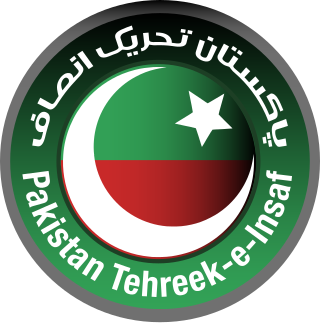
The Pakistan Tehreek-e-Insaf is a political party in Pakistan established in 1996 by Pakistani cricketer and politician Imran Khan, who served as the country's prime minister from 2018 to 2022. The PTI ranks among the three major Pakistani political parties alongside the Pakistan Muslim League–Nawaz (PML–N) and the Pakistan People's Party (PPP), and it is the largest party in terms of representation in the National Assembly of Pakistan since the 2018 general election. With over 10 million members in Pakistan and abroad, it claims to be the country's largest political party by primary membership, as well as one of the largest political parties in the world.
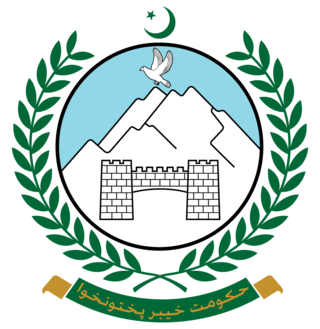
The Government of Khyber Pakhtunkhwa, is the provincial government of the Pakistani province of Khyber Pakhtunkhwa. Its powers and structure are set out in the provisions of the 1973 Constitution, in which 32 districts come under its authority and jurisdiction. The government includes the cabinet, selected from members the Khyber Pakhtunkhwa Assembly, and the non-political civil staff within each department. The province is governed by a unicameral legislature with the head of government known as the Chief Minister. The Chief Minister, invariably the leader of a political party represented in the Assembly, selects members of the Cabinet. The Chief Minister and Cabinet are thus responsible the functioning of government and are entitled to remain in office so long as it maintains the confidence of the elected Assembly. The head of the province is known as the Governor, appointed by the federal government, on behalf of the President, while the administrative boss of the province is Chief Secretary Khyber Pakhtunkhwa.
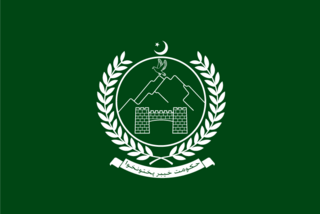
The chief minister of Khyber Pakhtunkhwa is the head of government of the Pakistani province of Khyber Pakhtunkhwa. The chief minister leads the legislative branch of the provincial government, and is elected by the Provincial Assembly. As long as she or he has the confidence of the assembly, a single term in office for the chief minister can be a maximum of five years. There is no term on the number of limits. The position is currently vacant due to the death of Muhammad Azam Khan.

The Pakistan Bar Council (PBC) (Urdu: پاکستان بار کونسل) was established by the Parliament in 1973 under the Legal Practitioners and Bar Councils Act.
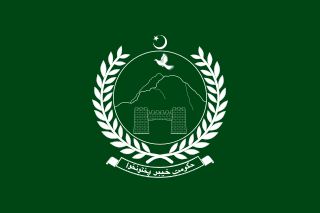
The Provincial Assembly ofKhyber Pakhtunkhwa is a unicameral legislature of elected representatives of the Pakistani province of Khyber Pakhtunkhwa, which is located in Peshawar, the provincial capital. It was established under Article 106 of the Constitution of Pakistan, having a total of 145 seats, with 115 general seats, 26 seats reserved for women and 4 reserved for non-Muslims. The 11th Provincial Assembly of the Khyber Pakhtunkhwa was dissolved on 18 January 2023, and the province is set to elect a new legislature on 8 October 2023.
Masood Kausar is a Pakistani politician who was 28th Governor of Khyber Pakhtunkhwa. He held many senior government positions including; Speaker of the Assembly, Minister for Communications, Deputy Leader of Opposition in Khyber Pakhtunkhwa province and Chairman of standing committee while he was Member of the Senate of Pakistan. He is one of the founding members of the Pakistan Peoples Party (PPP).

The Balochistan High Court is the highest judicial institution of Balochistan, Pakistan. The court is formally known as the High Court of Balochistan. It is situated in the provincial capital, Quetta.
Abdul Lateef Afridi, also known as Lateef Lala, was a Pakistani lawyer and politician who served in the National Assembly from 1997 until 1999 as a member of the Awami National Party. In September 2021, Afridi was one of the founders of the National Democratic Movement.
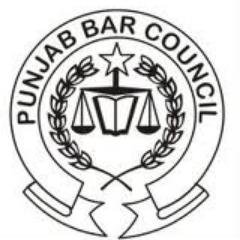
The Punjab Bar Council is a deliberative assembly of lawyers in Punjab, Pakistan.

Pervez Khan Khattak is a Pakistani politician who served as the Minister of Defence from August 2018 until April 2022. He had been a member of the National Assembly of Pakistan from August 2018 till January 2023. Prior to that, he served as the 22nd Chief Minister of Khyber Pakhtunkhwa from 2013 to 2018, elected to the Provincial Assembly from Nowshera District. He was a senior member of the Pakistan Tehreek-e-Insaf until July 2023, when he formed his breakaway faction, the Pakistan Tehreek-e-Insaf Parliamentarians (PTI-P). On 12 February 2024, he left the chairmanship of the PTI-P and took a break from politics tenders resignation as PTI-P chairman due to ‘health issues’.

Pervez Khattak administration was the coalition of provincial government of Khyber Pakhtunkhwa between Pakistan Tehreek-e-Insaf (PTI), the Islamist Jamaat-e-Islami (JI), Qaumi Watan Party (QWP), and Awami Jamhuri Ittehad Pakistan (AJIP). AJIP later merged itself with PTI.

The Sindh Bar Council is a statutory regulatory body of lawyers in Sindh for safeguarding the rights, interests, rights and privileges of practicing lawyers, within the province of Sindh, Pakistan. The Council is a deliberative body which regulates the conduct of lawyers and helps in the administration of justice. It has been constituted under Section 3(ii) of the Legal Practitioners and Bar Councils Act, 1973. All advocates practicing in any court or tribunal in Sindh are licensed and regulated by the Council. Advocates licensed and regulated by other provincial bar councils can also practice in Sindh.
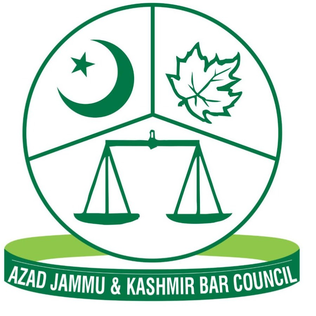
The Azad Jammu & Kashmir Bar Council, also known as AJK Bar Council, is a statutory & deliberative assembly of lawyers in Azad Kashmir for safeguarding the rights, interests and privileges of practicing lawyers, within Azad Kashmir.

The Balochistan Bar Council is a statutory & deliberative assembly of lawyers in Balochistan for safeguarding the rights, interests and privileges of practicing lawyers, within Balochistan province of Pakistan. The Council also regulates the conduct of lawyers and helps in the administration of justice. It has been constituted by Section 3(ii) of the Legal Practitioners and Bar Councils Act, 1973 of Constitution of Pakistan. All lower court and Balochistan High Court lawyers within Balochistan are licensed with this council.
The Kyber Pakhtunkhwa Judicial Academy is an institution of higher learning in Peshawar, Pakistan which focuses on legal and judicial studies. Its mission is "to change the attitude of young law graduates as judges and to inculcate in them patience, sobriety, confidence, discipline and skill of high quality legal reasoning; to develop their capacity; to enable them to create harmony among all justice sector institutions; to sensitize them to the rights of all litigant public, notably, of the vulnerable communities; and to make them leaders to contribute to the rule of law.
Abdul Latif Yousafzai is a supreme court lawyer of Pakistan, currently serving as Advisor to the National Assembly of Pakistan. Yousafzai was designated with the rank and status of Senior Provincial Minister while previously serving as the Advocate General of Khyber Pakhtunkhwa as well as Chairman Khyber Pakhtunkhwa Bar Council from 2013 to 2019. Prior to that he served as member of the Privatization Commission of Pakistan from 2008 until 2010 and as a member of the Alternate Dispute Resolution Committee for Federal Board of Revenue of Pakistan. He also served as the prosecutor general of National Accountability Bureau from 1999 to 2001. He was the Deputy Attorney General of Pakistan between October 1992 and 1995.

The Twenty-fifth Amendment to the Constitution of Pakistan was passed by the Parliament of Pakistan and the Khyber Pakhtunkhwa Assembly in May 2018. Under the amendment, the Federally Administered Tribal Areas (FATA) and Provincially Administered Tribal Areas (PATA) are to be merged with the province of Khyber Pakhtunkhwa (KP).

The Islamabad Bar Council is a statutory & deliberative assembly of lawyers in Islamabad Capital Territory for safeguarding the rights, interests and privileges of practicing lawyers, within Islamabad Capital Territory of Pakistan. The Council also regulates the conduct of lawyers and helps in the administration of justice. It has been constituted in 2014 after addition of Section 3(1)(iii) into the Legal Practitioners and Bar Councils Act, 1973 and became functional on 23 May 2015 after its first election. All advocates practicing in any court or tribunal in Islamabad, except the Supreme Court are licensed and regulated by the Council. Advocates licensed and regulated by other provincial bar councils can also practice in Islamabad.
Umar Ata Bandial is a Pakistani jurist who served as the 28th Chief Justice of Pakistan from February 2022 to September 2023. He was appointed as the Chief Justice after the approval by President Arif Alvi on 13 January 2022, after which he assumed his office on 2 February 2022 and retired on 16 September 2023.















